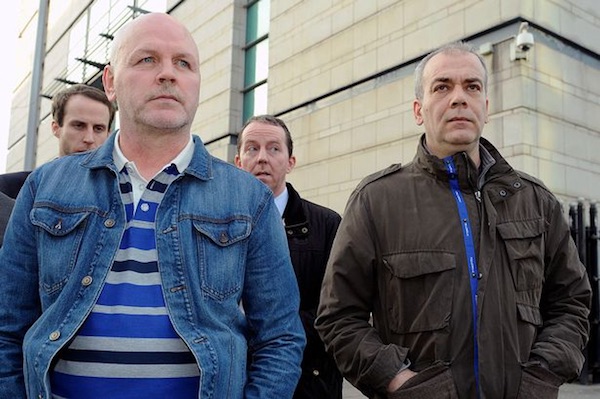
A court hearing in the long-running trial of three well-known republicans heard doubts about the prosecution’s evidence amid questions over the analysis of alleged covert audio recordings and the role of British military intelligence.
The charges relate to an attack on a PSNI convoy in north Belfast, for which Colin Duffy, Henry Fitzsimons, and Alex McCrory were remanded in custody in December 2013.
They were imprisoned without trial for over two years before being released on bail in February 2016. Their trial has been running now for over two years.
According to MI5, the men were recorded and videoed in a park in Lurgan discussing the attack the following day, but the defence says it has found inconsistencies and contradictions in the analysis of the recording.
Voice experts gave evidence in court on March 25 to support the prosecution’s claim that it was the accused who were speaking on the tape, according to a report for The Canary. But the defence said that part of the analysis of the audio was “fundamentally flawed”.
It said the features identified by the experts on the recording could belong to “hundreds of thousands of people” – so their analysis of the recording should be meaningless.
The defence also dismissed the prosecution’s claim that evidence needs only to be “relevant” to be admissible in court, claiming it must also be “prima facie authentic”. This is why, they said, the prosecution submissions on the issue were misconceived because they suggest that the only test is relevance.
The defence also questioned whether the prosecution had properly proven the authenticity of the tape recordings, and challenged whether they should be admissible.
The defence then turned to the evidence of MI5 agent known as ‘PIN 9281’. It said it didn’t have access to the relevant material to properly challenge hus evidence, but that it was “obviously wrong in different respects and contradictory” so as to be “not worthy of belief”.
The defence also accused MI5 of deliberately destroying all the identifying data and metadata from the recordings, creating a “vacuum” in the evidence.
It also pointed out that a draft transcript provided by the PSNI influenced the analysis of the experts, because the identities of the alleged speakers were revealed on that transcript. One voice expert admitted he “was given a steer”.
It said the experts should have told the PSNI not to provide this transcript. The defence added that while there were steps to mitigate the risk of cognitive bias, they didn’t take those steps, but one admitted he wouldn’t conduct the process that way again.
The judge is to give his ruling in the week beginning 19 April.
![[Irish Republican News]](https://republican-news.org/graphics/title_gifs/rn.gif)
![[Irish Republican News]](https://republican-news.org/graphics/title_gifs/harp.gif)

